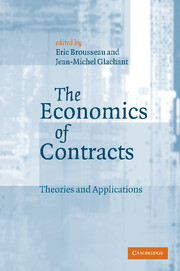Book contents
- Frontmatter
- Contents
- List of figures
- List of tables
- List of contributors
- Acknowledgments
- Part I Introduction
- Part II Contracts, organizations, and institutions
- Part III Law and economics
- Part IV Theoretical developments: where do we stand?
- Part V Testing contract theories
- 16 Econometrics of contracts: an assessment of developments in the empirical literature on contracting
- 17 Experiments on moral hazard and incentives: reciprocity and surplus-sharing
- Part VI Applied issues: contributions to industrial organization
- Part VII Policy issues: anti-trust and regulation of public utilities
- Bibliography
- Index of names
- Subject index
17 - Experiments on moral hazard and incentives: reciprocity and surplus-sharing
Published online by Cambridge University Press: 16 January 2010
- Frontmatter
- Contents
- List of figures
- List of tables
- List of contributors
- Acknowledgments
- Part I Introduction
- Part II Contracts, organizations, and institutions
- Part III Law and economics
- Part IV Theoretical developments: where do we stand?
- Part V Testing contract theories
- 16 Econometrics of contracts: an assessment of developments in the empirical literature on contracting
- 17 Experiments on moral hazard and incentives: reciprocity and surplus-sharing
- Part VI Applied issues: contributions to industrial organization
- Part VII Policy issues: anti-trust and regulation of public utilities
- Bibliography
- Index of names
- Subject index
Summary
Introduction
In the standard principal–agent model with moral hazard (Holmström 1979; Grossman and Hart 1987) the principal, who cannot observe the agent's effort, generally has an interest in proposing a contract with a variable remuneration that is a function of the realized profit. The model is based on the assumption of a stochastic relationship between the realized profit and the agent's effort; this relationship is common knowledge. As the agent's effort is unobservable to the principal, the contract has to provide an incentive for the agent to choose the effort level that is desired by the principal. In other words, the contract has to satisfy an incentive constraint. It also has to provide the agent with an expected utility that is as least as high as his utility without the contract. This is called the participation constraint. If the principal offered a contract with a fixed remuneration that is independent of the realized profit, the agent would provide the effort level that is least costly to him, which is in general the lowest possible effort. If the principal wants to induce a higher and more costly effort level by the agent, the contract has to be designed such that the agent maximizes his expected utility by choosing this effort level. Contract theory predicts that the principal keeps the entire expected surplus of the contract for himself and makes the agent just indifferent between rejecting and accepting the contract with the provision of the induced effort level.
This solution is based on the assumption that the stochastic relationship between the principal's profit and the agent's effort is common knowledge.
- Type
- Chapter
- Information
- The Economics of ContractsTheories and Applications, pp. 293 - 312Publisher: Cambridge University PressPrint publication year: 2002
- 3
- Cited by



